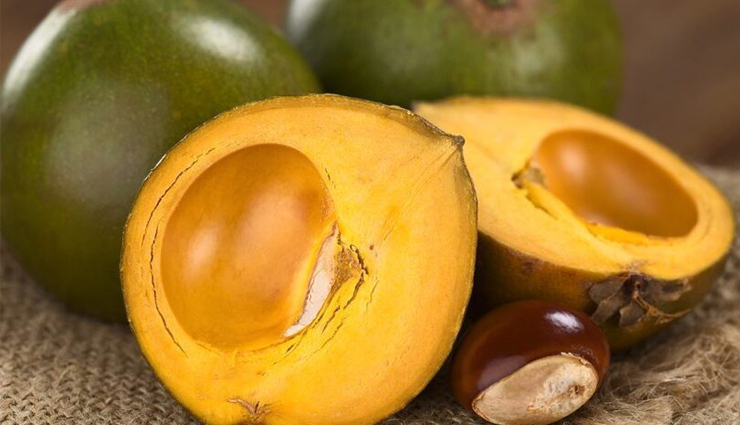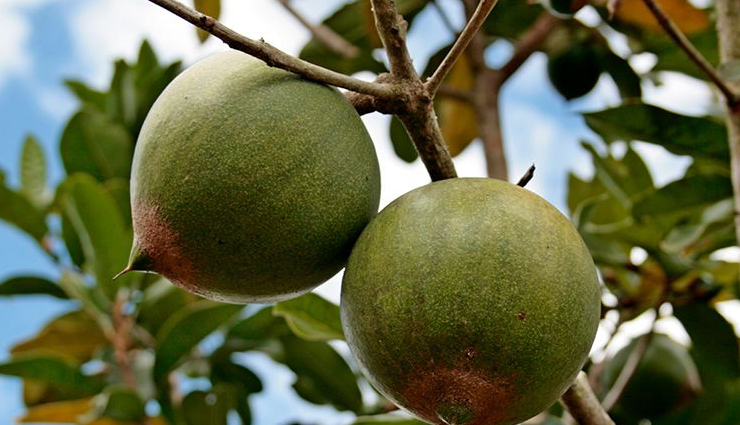- Home›
- Healthy Living›
- 5 Amazing Benefits Of Lucuma Fruit, Nutrition Facts, & Risks
5 Amazing Benefits Of Lucuma Fruit, Nutrition Facts, & Risks
By: Priyanka Maheshwari Mon, 04 Sept 2023 10:56:42

Lucuma, a delectable fruit, is abundant in vital vitamins, minerals, and antioxidants. The advantages of incorporating Lucuma fruit into your diet are abundant, extending to potential disease risk reduction. Among the Incas, it held a special place, regarded as a symbol of fertility. Across numerous South American regions, Lucuma serves as a dietary staple. This versatile fruit can be enjoyed in both its fresh and dried forms, and its powdered version can serve as an excellent sugar substitute.
What Is Lucuma Fruit?
Lucuma fruit, also known as Pouteria lucuma, is a subtropical fruit native to the Andes region of South America, particularly in Peru, Chile, and Ecuador. It is widely regarded as the "Gold of the Incas" due to its revered status in Incan culture and its bright orange-yellow flesh. Lucuma has been cultivated and consumed for centuries and is known for its unique flavor and potential health benefits.
Here are some key characteristics and information about lucuma fruit:
# Appearance: Lucuma fruit is typically small to medium-sized, with a round or oval shape. Its rough, green outer skin protects the sweet, dry, and dense orange-yellow flesh inside.
# Flavor: Lucuma has a distinctive flavor often described as a mix of sweet potato, maple, and butterscotch. Its unique taste makes it a popular ingredient in desserts, ice creams, and smoothies.
# Nutritional Value: Lucuma is not only delicious but also nutritious. It is rich in antioxidants, particularly carotenoids like beta-carotene, which gives it its vibrant color. Lucuma is also a good source of vitamins and minerals, including vitamin C, fiber, iron, and potassium.
# Culinary Uses: Lucuma is a versatile fruit used in various culinary applications. It is commonly used to sweeten desserts and beverages, such as ice cream, puddings, and shakes. In Peru, it is a key ingredient in the traditional dessert known as "lucuma ice cream" or "helado de lucuma," which is beloved by locals and tourists alike.
# Potential Health Benefits: Lucuma is associated with several potential health benefits due to its nutritional content and antioxidant properties. It may support skin health, boost the immune system, and help regulate blood sugar levels. Some people also use lucuma as a natural sweetener in place of sugar due to its sweet taste and lower glycemic index.
# Availability: Fresh lucuma fruit is not widely available outside of its native regions. However, it can be found in some specialty stores and international markets. More commonly, lucuma is sold in powdered or pureed form, making it easier to incorporate into recipes and smoothies.
# Cultural Significance: Lucuma holds cultural significance in Peru, where it is considered a symbol of fertility and abundance. It has been used in traditional medicine for its potential health benefits and is an integral part of Peruvian cuisine.

Nutritional Profile Of Lucuma Fruit
The nutritional profile of lucuma fruit showcases its richness in various essential nutrients, making it a noteworthy addition to a balanced diet. Below is an overview of the key components found in 100 grams of raw lucuma fruit:
Calories: Approximately 97 calories, which makes it a moderate-calorie fruit suitable for most diets.
Carbohydrates: Lucuma is carbohydrate-rich, containing around 23 grams of carbohydrates per 100 grams. These carbohydrates include dietary fiber (about 2.3 grams) and natural sugars.
Protein: Lucuma offers a modest amount of protein, with approximately 2 grams per 100 grams of fruit.
Fats: Lucuma has a low fat content, providing less than 1 gram of fat per 100 grams.
Vitamins: Lucuma is particularly rich in vitamin C, offering about 19 milligrams per 100 grams. This vitamin is essential for immune function and skin health.
Minerals: Lucuma contains various minerals, including potassium (around 320 milligrams per 100 grams), iron (about 1.5 milligrams), and phosphorus.
Antioxidants: Lucuma is a good source of antioxidants, including carotenoids like beta-carotene. These antioxidants can help protect cells from oxidative stress and contribute to overall health.
Fiber: While lucuma provides some dietary fiber (approximately 2.3 grams per 100 grams), it is not as fiber-rich as some other fruits.
Low Glycemic Index: Lucuma has a relatively low glycemic index (GI), which means it has a gradual impact on blood sugar levels when consumed. This makes it a suitable option for individuals looking to manage blood sugar.

Amazing Benefits of Lucuma Fruit
Rich in Antioxidants:
Lucuma is packed with antioxidants, including carotenoids like beta-carotene. Antioxidants help combat free radicals in the body, reducing oxidative stress and the risk of chronic diseases. Regular consumption of antioxidant-rich foods like lucuma can contribute to overall health and well-being.
Vitamin and Mineral Powerhouse:
Lucuma is a fantastic source of essential vitamins and minerals. It contains vitamin C, which supports immune function and skin health. Additionally, lucuma provides minerals such as potassium, iron, and phosphorus, which play vital roles in maintaining various bodily functions.
Supports Skin Health:
The high content of beta-carotene in lucuma is not only beneficial for its antioxidant properties but also for promoting healthy skin. Beta-carotene is known for its potential to enhance skin elasticity, reduce the signs of aging, and protect against UV damage.
Potential Blood Sugar Regulation:
Some research suggests that lucuma may help regulate blood sugar levels. Its low glycemic index means it has a gradual impact on blood sugar, making it a suitable option for individuals looking to manage glucose levels.
Rich and Unique Flavor:
Beyond its nutritional benefits, lucuma is treasured for its delightful flavor. Its taste, often likened to a combination of sweet potato, maple, and butterscotch, makes it a versatile ingredient for a variety of dishes and desserts. It can be used to sweeten smoothies, ice creams, baked goods, and more.

How To Add Lucuma To Your Diet?
Smoothies and Shakes:
Blend lucuma powder or puree into your morning smoothie or protein shake for a natural sweetener and a hint of its distinct flavor.
Combine lucuma with other fruits like bananas, mangoes, or berries for a flavorful and nutritious beverage.
Desserts:
Use lucuma powder to sweeten homemade ice creams, sorbets, or frozen yogurt. Lucuma's creamy texture and flavor pair wonderfully with these frozen treats.
Add lucuma to your pudding, custard, or mousse recipes for a unique twist on classic desserts.
Baking:
Incorporate lucuma powder into your baking recipes. It can be used as a sugar substitute to add natural sweetness and flavor to muffins, cookies, cakes, and bread.
Oatmeal and Cereal:
Sprinkle lucuma powder on your morning oatmeal or cereal for added flavor and natural sweetness. It pairs exceptionally well with granola and yogurt too.
Yogurt and Parfaits:
Mix lucuma puree or powder into your yogurt or create lucuma-flavored yogurt parfaits with layers of fruit and nuts.
Salad Dressings:
Experiment with lucuma in salad dressings. Combine it with olive oil, vinegar, and herbs to create a unique and slightly sweet vinaigrette.
Energy Bars and Snacks:
Make homemade energy bars or protein balls by incorporating lucuma powder into the mixture. This provides natural sweetness and a boost of flavor.
Hot and Cold Beverages:
Stir lucuma powder into your coffee, tea, or hot chocolate as a natural sweetener. It can also be used in cold beverages like iced tea and lemonade.
Sauces and Marinades:
Enhance the flavor of your sauces and marinades for meats, poultry, or tofu by adding a touch of lucuma puree or powder.
Infused Water:
Create a refreshing infused water by adding thin slices of fresh lucuma fruit along with other fruits and herbs to a pitcher of water. Let it sit for a subtle infusion of flavor.
Nut Butter:
Mix lucuma powder into almond or peanut butter for a naturally sweet and flavorful spread to use on toast, sandwiches, or as a dip for fruits and vegetables.
Chocolates and Truffles:
Incorporate lucuma into homemade chocolates or truffles for a unique and slightly sweet treat.

Side Effects And Allergies Of Lucuma Fruit
# Gastrointestinal Upset
Some people may experience mild gastrointestinal discomfort, such as bloating, gas, or diarrhea, after consuming lucuma. This is more likely to occur if lucuma is consumed in excessive amounts.
# Allergic Reactions
While rare, some individuals may be allergic to lucuma fruit. Allergic reactions can vary in severity and may include symptoms such as itching, skin rashes, hives, or swelling of the face, lips, tongue, or throat. If you suspect an allergic reaction to lucuma, seek immediate medical attention.
# Cross-Allergies
Lucuma belongs to the same botanical family as other fruits, such as sapote and mamey sapote. If you have known allergies to fruits in the Sapotaceae family, you may be at a higher risk of being allergic to lucuma as well.
# Interactions with Medications
There is limited information available regarding potential interactions between lucuma and medications. If you are taking any medications, especially for blood sugar regulation or blood-thinning, consult with a healthcare professional before adding lucuma to your diet.
# Over consumption
While lucuma is generally safe in moderation, consuming excessive amounts of any food can lead to digestive discomfort. Be mindful of your lucuma intake and incorporate it into your diet sensibly.





